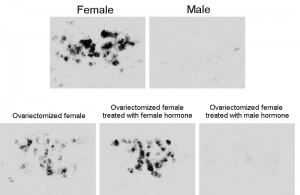Are male (fish) always in love? Brain areas implicated in sexual behavior respond to sex hormones only in females

In many animal species, females exhibit sexual behavior only under restricted terms and conditions, whereas males are capable of sexual behavior at any time. Ms. Towako Hiraki and Dr. Kataaki Okubo at the University of Tokyo Graduate School of Agricultural and Life Sciences and their colleagues have discovered that in fish, brain areas implicated in sexual behavior can respond to sex hormones only in females but not in males, which can account for the above-described gender difference in sexual behavior patterns. The researchers also found that this sex difference in the brain is reversible, dependent on the sex hormonal milieu, even in adulthood. This mechanism may underlie the widely-known phenomenon that fish and their brains can undergo sex reversal even after sexual maturity.
Press release (Japanese)
Paper
Towako Hiraki, Akio Takeuchi, Takayasu Tsumaki, Buntaro Zempo, Shinji Kanda, Yoshitaka Oka, Yoshitaka Nagahama, Kataaki Okubo,
“Female-specific target sites for both oestrogen and androgen in the teleost brain”,
Proceedings of the Royal Society B Biological Sciences (Online Edition) 2012/10/17 (Japan time), doi: 10.1098/rspb.2012.2011.
Article link
Links
Graduate School of Agricultural and Life Sciences
Department of Aquatic Bioscience (Japanese)
Laboratory of Aquatic animal physiology (Japanese)








